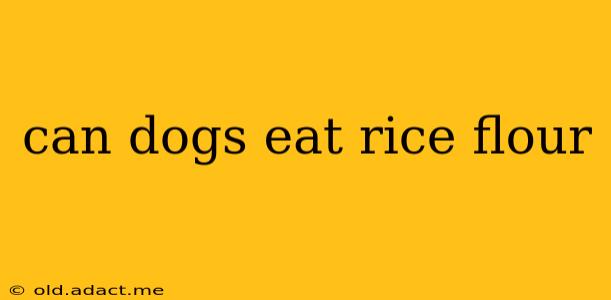Rice flour, a staple in many human cuisines, often sparks curiosity among pet owners: is it safe for canine companions? The short answer is: generally yes, but with important caveats. While small amounts of plain, cooked rice flour are unlikely to harm a healthy dog, several factors influence its suitability as a dog treat or ingredient. This comprehensive guide delves into the details, addressing common concerns and offering expert advice.
Is Rice Flour Safe for Dogs?
Yes, plain, cooked rice flour is generally considered safe for dogs in moderation. It's a relatively bland and easily digestible carbohydrate source. However, "safe" doesn't mean "ideal." Rice flour lacks the essential nutrients found in a balanced dog food, so it shouldn't replace a complete and balanced diet.
What are the Benefits of Rice Flour for Dogs?
While not a nutritional powerhouse, rice flour offers some potential benefits:
- Thickening Agent: In homemade dog treats or foods, rice flour can act as a thickening agent, binding ingredients together.
- Gluten-Free Option: For dogs with gluten sensitivities, rice flour provides a gluten-free alternative to wheat flour.
- Easily Digestible: Cooked rice flour is generally easy for most dogs to digest, making it a suitable option for sensitive stomachs (though always introduce new foods gradually).
What are the Risks of Feeding Rice Flour to Dogs?
Despite its generally safe nature, several risks are associated with feeding rice flour to dogs:
- Allergies: While uncommon, some dogs may exhibit allergic reactions to rice. Introduce rice flour gradually and monitor your dog for any signs of allergy, such as itching, vomiting, or diarrhea.
- Calorie Content: Rice flour is relatively high in calories. Excessive consumption can lead to weight gain and obesity.
- Nutritional Deficiency: Rice flour lacks the essential nutrients a dog needs for optimal health. Relying on rice flour as a significant food source will lead to nutritional deficiencies.
- Uncooked Rice Flour: Never feed your dog uncooked rice flour. Uncooked rice can cause digestive upset and may contain harmful contaminants.
What Kind of Rice Flour is Safe for Dogs?
Only plain, cooked rice flour should be given to dogs. Avoid rice flours containing added sugars, flavorings, or other additives. These additives can be harmful to your dog's health.
How Much Rice Flour Can I Give My Dog?
There's no definitive amount of rice flour that's universally safe for all dogs. The appropriate amount depends on factors such as your dog's size, breed, age, activity level, and overall health. As a general rule, use rice flour sparingly, incorporating it only as a small component of a balanced diet, not as a primary food source. Always consult your veterinarian before making significant dietary changes for your dog.
Can Rice Flour Cause Diarrhea in Dogs?
While generally digestible, rice flour can cause diarrhea in dogs if consumed in large quantities or if the dog has a sensitive stomach. Introduce any new food, including rice flour, gradually to minimize the risk of digestive upset.
Can I Use Rice Flour in My Dog's Food?
Yes, small amounts of cooked rice flour can be used in homemade dog treats or food recipes as a thickening agent or binder. However, ensure the entire recipe provides a balanced nutritional profile for your dog. Don't rely solely on rice flour for nutrition.
In Conclusion: Moderation is Key
Rice flour, when used judiciously and correctly, poses minimal risk to dogs. However, it's crucial to remember that it's not a substitute for a complete and balanced dog food. Always prioritize a high-quality dog food formulated to meet your dog's specific nutritional needs. Use rice flour only sparingly and in moderation as an occasional ingredient in homemade treats. If you have any concerns, consult your veterinarian before introducing rice flour or any new food into your dog's diet.
